
Corriere della Sera is an Italian daily newspaper published in Milan with an average circulation of 246,278 copies in May 2023. First published on 5 March 1876, Corriere della Sera is one of Italy's oldest newspapers and is Italy's most read newspaper. Its masthead has remained unchanged since its first edition in 1876. It reached a circulation of over 1 million under editor and co-owner Luigi Albertini between 1900 and 1925. He was a strong opponent of socialism, clericalism, and Giovanni Giolitti, who was willing to compromise with those forces during his time as prime minister of Italy. Albertini's opposition to the Italian fascist regime forced the other co-owners to oust him in 1925.
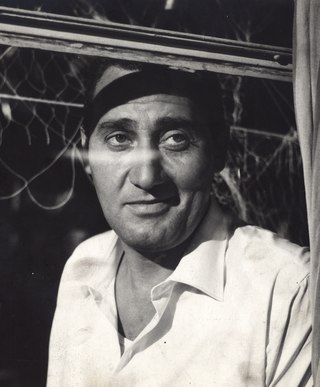
Alberto Sordi was an Italian actor, comedian, director, singer, and screenwriter.

Mario Alberto Ettore Monicelli was an Italian film director and screenwriter, one of the masters of the commedia all'italiana. He was nominated six times for an Oscar, and received the Golden Lion for his career.
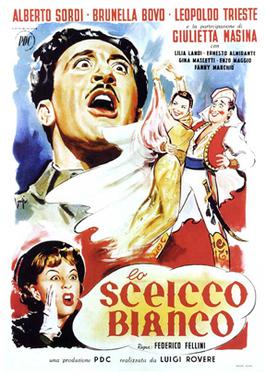
The White Sheik is a 1952 Italian romantic comedy film directed by Federico Fellini and starring Alberto Sordi, Leopoldo Trieste, Brunella Bovo and Giulietta Masina. Written by Fellini, Tullio Pinelli, Ennio Flaiano and Michelangelo Antonioni, the film is about a man who brings his new bride to Rome for their honeymoon, to have an audience with the Pope, and to present his wife to his family. When the young woman sneaks away to find the hero of her romance novels, the man is forced to spend hour after hour making excuses to his eager family who want to meet his missing bride. The White Sheik was filmed on location in Fregene, Rome, Spoleto and Vatican City.

I vitelloni is a 1953 Italian comedy drama film directed by Federico Fellini from a screenplay written by himself, Ennio Flaiano and Tullio Pinelli. It stars Franco Interlenghi, Alberto Sordi, Franco Fabrizi, Leopoldo Trieste, and Riccardo Fellini as five young Italian men at crucial turning points in their small town lives. Recognized as a pivotal work in the director's artistic evolution, the film has distinct autobiographical elements that mirror important societal changes in 1950s Italy.

Università Campus Bio-Medico di Roma is a not for-profit college situated in Trigoria, founded in 1993 and promoted by the Blessed Alvaro del Portillo, according to the principles of the Catholic prelature of the Opus Dei.
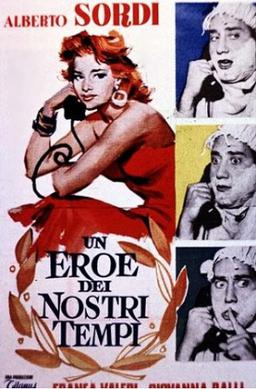
A Hero of Our Times is a 1955 Italian comedy film directed by Mario Monicelli and starring Alberto Sordi. In 2008, the film was included on the Italian Ministry of Cultural Heritage’s 100 Italian films to be saved, a list of 100 films that "have changed the collective memory of the country between 1942 and 1978."

Mafioso is a 1962 Italian Mafia black comedy film directed by Alberto Lattuada. The film stars Alberto Sordi as a factory manager who visits his hometown in Sicily and is tasked with performing a hit for the Mafia. It was awarded Best Film at the San Sebastian Film Festival. In 2008, the film was included on the Italian Ministry of Cultural Heritage’s 100 Italian films to be saved, a list of 100 films that "have changed the collective memory of the country between 1942 and 1978."

The Great War is a 1959 Italian comedy-drama war film directed by Mario Monicelli. It tells the story of an odd couple of army buddies in World War I; the movie, while played on a comedic register, does not hide from the viewer the horrors and grimness of trench warfare. Starring Alberto Sordi and Vittorio Gassman and produced by Dino De Laurentiis, the film won the Golden Lion at the Venice Film Festival. Its crew also included Danilo Donati (costumes) and Mario Garbuglia.
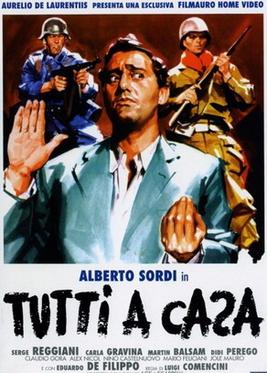
Everybody Go Home is a 1960 Italian comedy-drama film directed by Luigi Comencini. It features an international cast including the U.S. actors Martin Balsam, Alex Nicol and the Franco-Italian Serge Reggiani. Nino Manfredi was rejected for the starring role because Alberto Sordi wanted it.
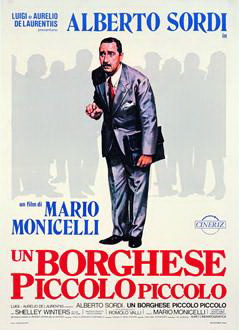
An Average Little Man is a 1977 Italian drama film directed by Mario Monicelli. It is based on the novel of the same name written by Vincenzo Cerami. The movie mixes "Italian-Style Comedy" with psychological drama tragedy. The film was an entrant in the 1977 Cannes Film Festival. In 2008, the film was included on the Italian Ministry of Cultural Heritage’s 100 Italian films to be saved, a list of 100 films that "have changed the collective memory of the country between 1942 and 1978."
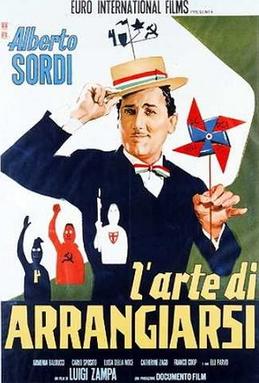
The Art of Getting Along is a 1954 comedy film directed by Luigi Zampa and starring Alberto Sordi. Following Difficult Years and Easy Years, it is the third and final chapter in the trilogy about Italian politics under the continuing shadow of fascism conceived by Vitaliano Brancati. In the person of an unprincipled Sicilian rogue, it delivers a satirical portrait of Italian society from 1913 to 1953.

An American in Rome is a 1954 Italian comedy film directed by Steno. The film consists in a satire of Americanization, and it was referred as "a milestone in the evolution of Italian self-identification". It starred Alberto Sordi, with a young Ursula Andress in a minor role. In 2008, the film was included on the Italian Ministry of Cultural Heritage’s 100 Italian films to be saved, a list of 100 films that "have changed the collective memory of the country between 1942 and 1978."
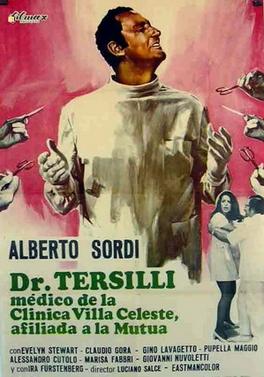
Il Prof. Dott. Guido Tersilli, primario della clinica Villa Celeste, convenzionata con le mutue is a 1969 Italian comedy film directed by Luciano Salce.
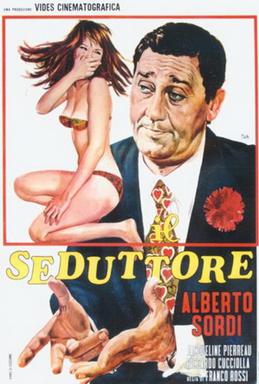
Il seduttore is a 1954 Italian comedy film directed by Franco Rossi. It was adapted from the play by Diego Fabbri.

Guido Piovene was an Italian writer and journalist.
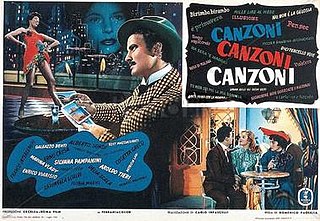
Cavalcade of Song is a 1953 Italian musical film directed by Domenico Paolella and starring Alberto Sordi, Silvana Pampanini and Antonella Lualdi.

Permette? Alberto Sordi is a 2020 Italian film directed by Luca Manfredi. The film narrates the twenty years of Alberto Sordi's life, from 1937 to 1957, from his beginnings to his celebrity, retracing his friendships, loves and his career; the film is one of the initiatives planned for the centenary of the birth of the Roman actor.
Vacanze di Natale '91 is a 1991 Italian comedy film directed by Enrico Oldoini.
Franco Abbina is an Italian actor, active until the first half of the 1970s.


















